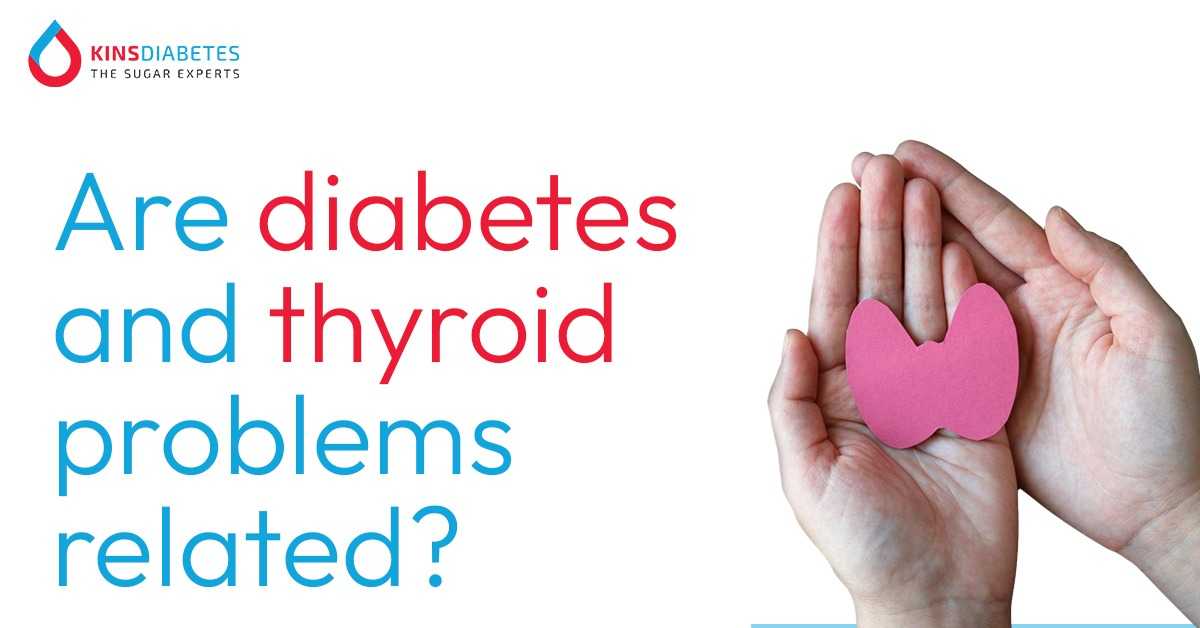The Connection Between Diabetes And Thyroid Disease
Being diagnosed with both diabetes and thyroid disease is a common occurrence among patients. Both are caused by a way of hormonal imbalances and affect cardiovascular health. Moreover, having one disease increases the likelihood of having the other.
Considerable research has been carried out about the relationship between the two diseases. A good finding is that patients are able to live comfortable life despite their illnesses. Here is a simple explanation of the topic.
What are diabetes and thyroid disease exactly?
Diabetes is linked directly with the sugar levels in your blood. When the sugar level goes up, your pancreas releases insulin. This allows the blood sugar to enter the body’s cells for use as energy.
Diabetes prevents the pancreas from releasing insulin, or the cells from responding to insulin. This can lead to a heart attack, stroke, kidney problems, nerve damage, and more complications. There are different types of diabetes, with type 2 being the most common.
The thyroid is a butterfly-shaped gland located in the front of the neck. It releases hormones that maintain metabolism, mood, heart rate, and other bodily functions. Thyroid disease prevents the gland from producing hormones efficiently.
This can happen in two ways. Either the thyroid releases excessive amounts of hormones. This will affect sleep, increased heart rate, weakened muscles, and loss of weight (hyperthyroidism) or it releases too little of the hormones (hypothyroidism) which will cause weight gain, constipation, forgetfulness, and fatigue.
How are diabetes and thyroid disease related?
Studies show that diabetes and thyroid disorders are closely related. A cross-sectional survey called the Third National Health and Nutrition Examination Survey (NHANES III) was conducted with 17,353 participants in the USA. It revealed that subjects with diabetes had thyroid dysfunction more than those without diabetes.
Both the thyroid and the pancreas are part of the endocrine system. This system handles the release of hormones into the bloodstream. Which regulates physiology and behaviour, including metabolism, vision, sleep, growth, stress, respiration, and more. Hence, being diagnosed with one disease affects the entire system.
Hyperthyroidism increases the secretion of insulin and glucagon in the body. This adversely affects the breakdown of glucose into energy. Glucagon is released by the pancreas when the sugar levels in the blood are low. The glucose intolerance caused by hyperthyroidism can lead to the development of diabetes.
The slowdown of metabolism caused by hyperthyroidism causes insulin to stay in the bloodstream for longer period of time which can also lead to insulin resistance. This is when the cells of the body stop responding normally to the hormone insulin. Increasing the likelihood of diabetes.
The thyroid gland is responsible for growth and metabolism. Its deterioration can lead to weight gain, causing fluctuations in blood sugar levels. Conversely, when blood sugar levels are affected by diabetes, the thyroid is forced to release hormones in an irregular manner. This puts stress on the gland, which can eventually lead to a thyroid disorder.
Thyroid disorders can also be of the autoimmune kind. Research shows that around 17-30 % of adults suffering from type 1 diabetes also has autoimmune thyroid disease. And 25% of children with type 1 diabetes have hypothyroidism. All caused by a dysfunctional immune system (which is also affected by genetics).
How to take care of your thyroid when suffering from diabetes?
The pancreas is part of the larger endocrine system. So being diagnosed with diabetes should have a natural concern. And that is about the proper functioning of the thyroid gland. The first step is of course to seek professional help - an endocrinologist is a good place to start.
Diagnosed with diabetes? Be on the lookout for symptoms of thyroid dysfunction as well. An enlarged thyroid is an obvious indicator. However symptoms like tiredness, eye irritation, and stress are often swept under the rug and believed to be normal occurrences. As such, it is important to be aware of the changes in your body, even minor ones, in order to avoid complications.
As with most chronic diseases, the best way to prevent your diabetes from growing, and causing other issues like thyroid dysfunction, is to live a health-conscious life. You should try to maintain your ideal weight, and exercise consistently. Being active helps control blood sugar levels, boosts metabolism, and prevents lethargy.
Maintaining a healthy diet is a must as well. Try including these listed items in your regular meal.
- Fibrous foods - vegetables like leaves, broccoli, and cauliflower
- Fruits like tomatoes, berries, peppers, and apples
- Legumes
- Whole-grains
These food items lower blood sugar levels. They provide natural sugar as well as absorb excess sugar. It is also important to limit the intake of fatty foods and replace them with healthy fats. Nuts and seeds, such as walnuts, almonds, hazelnuts, flaxseed, and pumpkin seeds. They are full of good fats and very healthy for the heart. Fatty fish like salmon, anchovies, tuna, sardines, and cod also help prevent heart disease.
Everyone’s body is different, and it is best to get personalized medical advice from a doctor. KINS Diabetes Speciality Centre is one of the best medical facilities in Siliguri. We have the finest facilities and medical professionals with the highest experience. Diabetes is a lifelong disease, and KINS is dedicated to helping patients suffering from it, lead a fulfilling and comfortable life.
If you want to learn more about diabetes, and how to keep it under control, check out our other blogs.
Websites used for references:
https://wwwn.cdc.gov/nchs/nhanes/nhanes3/default.aspx
https://www.ncbi.nlm.nih.gov/pmc/articles/PMC6507635/




